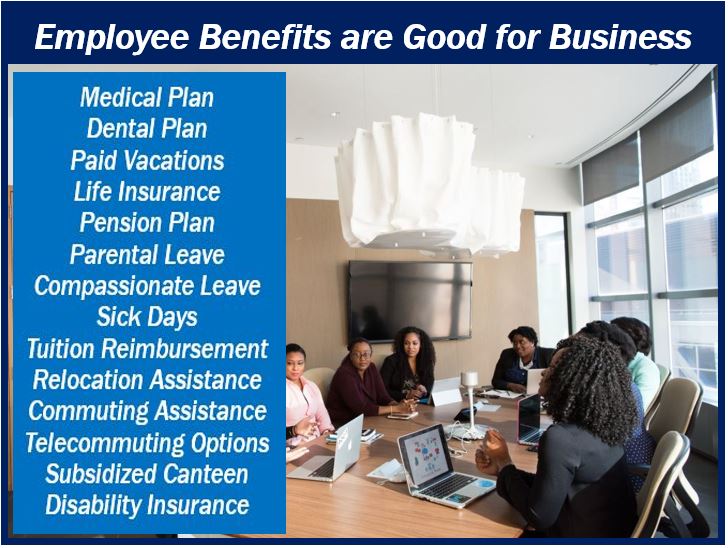Offering employees a good benefits package is one of the main ways to maintain retention. Retention or employee retention, in this context, refers to a company’s ability to keep its workers.
Many small enterprises mistakenly believe that they are not in a position to offer employee benefits. Yes, running a business without benefits will boost your bottom line; but the advantage is only short term. In the long-run, such a strategy will undermine your company’s prosperity and your business goals and objectives.
 Top of the list of benefits that is a must-have is medical insurance. A company without good HSA administration will have its employees heading for the door. Other benefits that employees look out for include retirement and disability plans among others.
Top of the list of benefits that is a must-have is medical insurance. A company without good HSA administration will have its employees heading for the door. Other benefits that employees look out for include retirement and disability plans among others.
The importance of offering your employees benefits cannot be underestimated. Give them what they deserve and they are less likely to skip work, will be more motivated, efficient, and productive. They will also have the zeal to work extra to meet the company’s goals. Employee loyalty is considerably greater in companies that offer comprehensive benefits compared to their less generous counterparts.
Benefit basics
It is equally important for companies to offer employee benefits in accordance with stipulated state and federal laws.
Mandatory benefits
As such, below are some key elements the law requires all organizations to comply with concerning employee benefits:
- Allow their employees time to vote, go for military service/duty, and serve on a jury.
- Companies should comply with all laws relating to workers’ compensation.
- Deduct FICA taxes from employee remuneration and also pay the company’s FICA taxes.
- Provide employees with disability and retirement benefits.
- Pay federal and state unemployment taxes.
- Adhere to FMLA (Federal Family and Medical Leave).
Optional benefits
However, there are certain benefits that companies are not required to provide. They include:
- Medical plans, except in regions like Hawaii, where it is compulsory.
- Retirement plans.
- Life insurance.
- Sick leave.
- Paid vacations.
As much as the above benefits are not a must-give for employers, most of them offer them to their employees to ensure they remain competitive in the market.
Some of the paid holidays that companies offer their employees include:
- Christmas day.
- Thanksgiving.
- New Year’s eve.
- Labor day.
- Independence day.
- Memorial day.
During such holidays, some employers opt to let their workers take time off without pay. Additionally, employees expect at least one or two weeks’ paid vacation annually. It is for the company to specify how long in advance vacation requests should be submitted to the management. Employees should be told whether their requests need to be verbal or in writing.
In the case of FMLA, the law requires employees to be given up to 12 weeks unpaid leave when their child is born or adopted, and in the case of a serious medical condition that affects the employee or an immediate family member. After the 12 weeks, that worker should be reinstated to their previous position or an equivalent one.
The 12 weeks could be taken at once or in parts.
Legal matters on employee benefits
We often read or hear in the news about companies under fire because of employee benefit problems. In most cases, the reports are about a failure to comply with national or regional laws and regulations. Perhaps there was a problem, for example, with workers’ retirement or health plans.
It is easy for a company to make mistakes while setting up benefits for their employees. One audit can get the IRS and Department of Labor knocking at your company’s door if your plan does not comply with regulations.
If mistakes are found in the way employee benefits are set up or handled, the company could lose its tax benefits. It could also be liable for some hefty fines.
Don’t hit benefits to cut costs
One of the greatest mistakes an employer can make is to exclude employees from a certain benefit plan. Some companies will do this as a way to cut costs. However, such a move is highly discouraged as their repercussions will probably hurt the business.
The rule of thumb is that if one employee qualifies for a certain benefit, which is paid by pretax dollars, then their colleague is also entitled to the same benefit.
When setting up employee benefits for your company, you should ideally seek advice from a lawyer or a specialized benefits consultant. You should also try to find out what your competitors offer and make sure you are not falling behind. If you are, as soon as the word gets out that rivals are offering better benefits and conditions, you are at serious risk of losing key personnel.
___________________________________________________________________
Interesting related articles:

